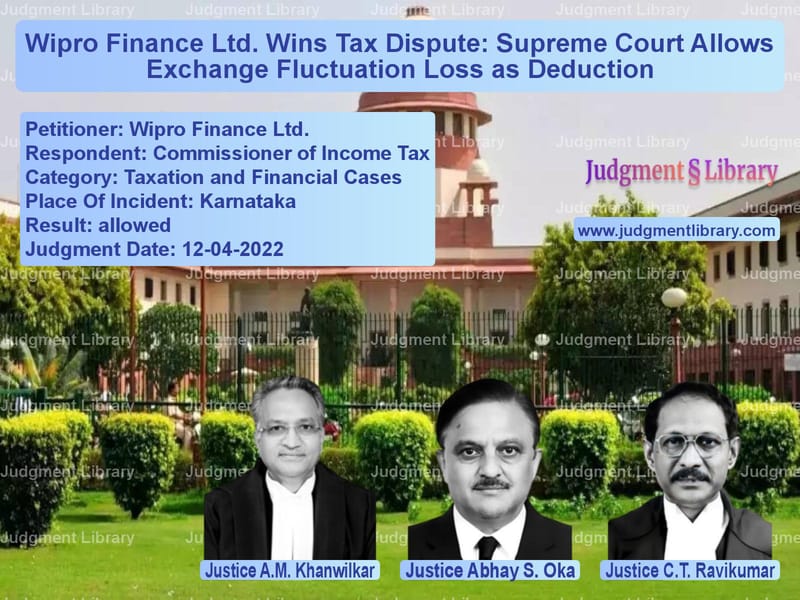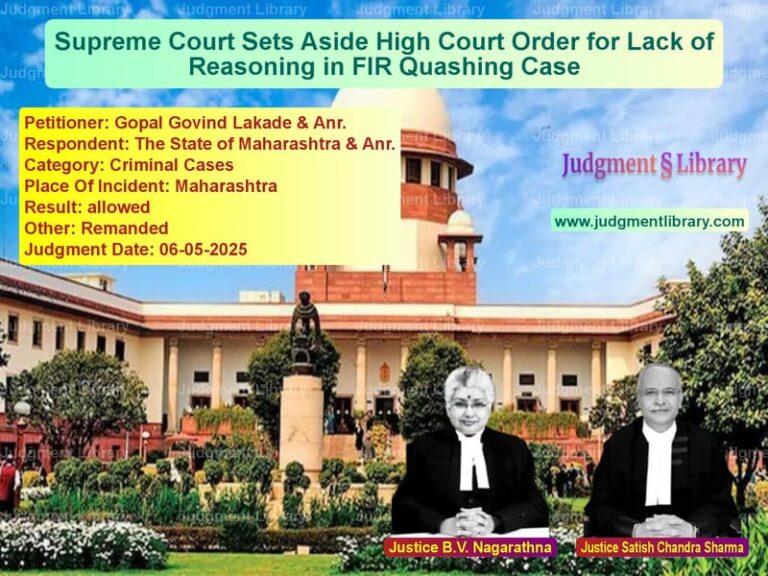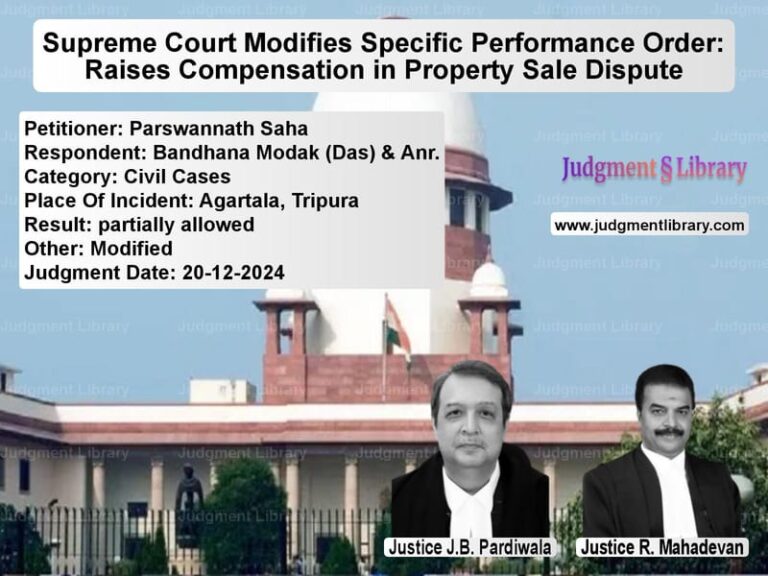Wipro Finance Ltd. Wins Tax Dispute: Supreme Court Allows Exchange Fluctuation Loss as Deduction
The Supreme Court of India recently ruled in favor of Wipro Finance Ltd. in a significant tax dispute against the Commissioner of Income Tax. The case revolved around whether exchange fluctuation losses incurred on foreign loans should be treated as revenue expenditure and be deductible under the Income Tax Act, 1961.
The judgment reversed the Karnataka High Court’s decision and restored the ruling of the Income Tax Appellate Tribunal (ITAT), which had allowed Wipro Finance Ltd. to claim exchange fluctuation loss as revenue expenditure. The Supreme Court emphasized that when foreign loans are used for business purposes, any resulting losses due to currency fluctuations should be deductible under Section 37 of the Income Tax Act.
Background of the Case
Wipro Finance Ltd. had borrowed a foreign currency loan from the Commonwealth Development Corporation, a UK-based entity, to finance leasing and hire purchase activities. The company later incurred a loss of ₹1,10,53,909 due to exchange rate fluctuations while repaying the loan. In its tax return for the assessment year 1997-98, the company claimed this loss as a deductible expense under the Income Tax Act.
The Income Tax Department disallowed this claim, treating the exchange fluctuation loss as a capital expenditure instead of revenue expenditure. The matter was appealed before the Commissioner of Income Tax (Appeals), then before the ITAT, and finally reached the High Court of Karnataka, which ruled against Wipro Finance Ltd. The company then challenged the decision before the Supreme Court.
Petitioners’ Arguments
Wipro Finance Ltd. put forth the following arguments:
- The loan was used entirely for business purposes, specifically for financing customers under leasing and hire purchase arrangements.
- Exchange fluctuation losses were incidental to business operations and should be treated as revenue expenditure.
- Since the company did not acquire any capital asset with the loan, the expenditure could not be classified as capital in nature.
- The ITAT had correctly interpreted the law, and the High Court erred in reversing its decision.
Respondents’ Arguments
The Income Tax Department, representing the Commissioner of Income Tax, argued that:
- The loss should be treated as capital expenditure since the loan was taken for business expansion.
- Wipro Finance Ltd. had initially classified the expenditure as capital in its tax returns, and thus it was not open for reclassification later.
- The High Court was correct in holding that the ITAT had not provided sufficient reasons for allowing the claim.
Supreme Court’s Judgment
The Supreme Court bench, comprising Justices A.M. Khanwilkar, Abhay S. Oka, and C.T. Ravikumar, ruled in favor of Wipro Finance Ltd. The Court made the following key observations:
- Nature of the Expenditure: The Court held that the exchange fluctuation loss was incurred in the normal course of business and should be treated as revenue expenditure.
- Relevance of Loan Utilization: Since the loan was not used for acquiring a capital asset but was instead used for financing customers, it could not be classified as capital expenditure.
- Jurisdiction of ITAT: The Supreme Court reaffirmed that the ITAT had the authority to entertain fresh claims under Section 254 of the Income Tax Act.
- Errors in High Court Ruling: The Court found that the High Court had failed to properly consider the ITAT’s detailed reasoning and legal precedents.
Implications of the Judgment
This ruling has several important implications:
- Recognition of Exchange Fluctuation Losses: Businesses engaged in foreign transactions can now claim exchange fluctuation losses as revenue expenditure.
- Precedent for Tax Authorities: The ruling clarifies how exchange losses should be treated under tax laws, preventing unnecessary disallowances by tax authorities.
- Authority of ITAT: The decision strengthens the ITAT’s role in handling tax disputes and clarifies that fresh claims can be entertained if they pertain to existing tax issues.
- Encouragement for Cross-Border Financing: Companies involved in international trade or financing will find it easier to manage foreign currency risks, as such losses are now clearly deductible.
Conclusion
The Supreme Court’s ruling in Wipro Finance Ltd. vs. Commissioner of Income Tax is a landmark decision that clarifies the treatment of exchange fluctuation losses in taxation. By reinforcing the principle that such losses incurred during business operations should be treated as revenue expenditure, the ruling provides greater certainty to businesses operating in foreign exchange markets. The judgment ensures that companies are not unfairly taxed on losses that are inherent to global financial transactions.
Read also: https://judgmentlibrary.com/amalgamated-companies-and-tax-liability-supreme-courts-key-ruling/
Petitioner Name: Wipro Finance Ltd..Respondent Name: Commissioner of Income Tax.Judgment By: Justice A.M. Khanwilkar, Justice Abhay S. Oka, Justice C.T. Ravikumar.Place Of Incident: Karnataka.Judgment Date: 12-04-2022.
Don’t miss out on the full details! Download the complete judgment in PDF format below and gain valuable insights instantly!
Download Judgment: wipro-finance-ltd.-vs-commissioner-of-inco-supreme-court-of-india-judgment-dated-12-04-2022.pdf
Directly Download Judgment: Directly download this Judgment
See all petitions in Income Tax Disputes
See all petitions in Tax Refund Disputes
See all petitions in Banking Regulations
See all petitions in Judgment by A M Khanwilkar
See all petitions in Judgment by Abhay S. Oka
See all petitions in Judgment by C.T. Ravikumar
See all petitions in allowed
See all petitions in supreme court of India judgments April 2022
See all petitions in 2022 judgments
See all posts in Taxation and Financial Cases Category
See all allowed petitions in Taxation and Financial Cases Category
See all Dismissed petitions in Taxation and Financial Cases Category
See all partially allowed petitions in Taxation and Financial Cases Category







